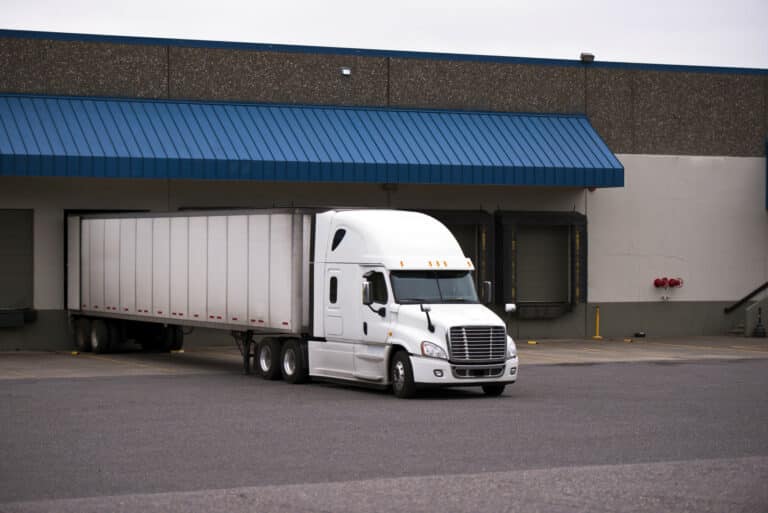Wondering if cross-docking is suitable for your company’s shipping needs? Attempting to understand the benefits of cross-docking?
If you want to streamline freight operations and experience various other benefits, you may use cross-docking. Secure cross-docking is an excellent solution that can work well for meeting freight needs, minimizing costs, and boosting customer satisfaction. In this article, we’ll tell you about the 7 top benefits of cross-docking for your freight operations.
What Is Cross-Docking?
Cross-docking is a logistics practice in which freight is unloaded from a delivery vehicle and then loaded directly onto an outbound shipment vehicle with minimal or no storage time.
Cross-docking goods are quickly sorted when you choose to use Canal Cartage’s cross-docking practices. Once the goods and products have been sorted, they are taken to an outbound dock with a forklift or a pallet truck. Received products will be immediately moved into transportation to be delivered to end customers.
As part of an intermodal freight strategy, cross-docking offers a range of excellent benefits. Utilizing cross-docking practices will increase efficiency by streamlining the supply chain. It will also help reduce costs significantly.
Advantages of Cross-Docking
So what are the benefits of cross-docking? Here are a few of the ways that cross-docking can be advantageous.
Reduces Property Needs
One of the benefits of cross-docking is that it reduces the need for a large warehouse and its costs to maintain one.
Warehouse rental and property costs can be very expensive and can impact a business’s bottom line. When your company chooses to cross-dock with Canal Cartage, much less square footage will be needed in our cross-docking facility than with a typical warehouse. The costs associated with renting a warehouse, maintaining it, and securing it, will be eliminated, and a smaller intermodal facility can be used very quickly.
Minimized Labor Costs
Using a cross-docking facility can also help to reduce the costs of labor as well.
A typical warehouse will need managers and a sizeable staff to manage goods and maintain security. Compared to a standard warehouse facility, a cross-docking facility will require much less staff to handle products and sort them effectively. Reducing staff and saving costs are great benefits of cross-docking. Your delivery products will not be stored for long amounts of time in a cross-docking facility.
Since products are shipped out immediately upon arrival, you’ll be able to work with far fewer staff and reduced labor costs.
Reduces Material Handling Errors
When products get damaged, it often happens during handling in a warehouse rather than while being shipped. Product damage can occur when products are moved around a warehouse with forklifts or when inventory is taken.
In a cross-docking facility, products will be handled for a minimal amount of time, leading to fewer instances of breakage and damage. Due to more products making it through shipping and less damage, costs can be reduced significantly.
Speeds Up Delivery Times
Like with intermodal drayage, another great benefit of cross-docking is that it reduces overall delivery time. Freight moves faster through cross-docking because products will spend minimal time in a warehouse facility and will remain in movement continually. Because products will be processed more quickly, your freight will reach the distributor and get to your customer more quickly as well.
When tracking a shipment, a customer will be happy to see that a product is in motion and not spending too much time at a warehouse facility.
Cross-docking will help ensure that customers are satisfied with the shipping process and receive their shipments more quickly. Faster shipping times will lead to increased customer satisfaction and a better business overall.
Strengthens Quality Control
Cross-docking can also help when it comes to checking the quality of products and inspecting them thoroughly.
Once products have been unloaded, staff members can manually check the goods and see any damage. This inspection can help reduce the instances of damaged products during delivery, helping ensure that they are in great shape when sent to a customer.
Reduces Transportation Costs
Utilizing cross-docking also has the potential to reduce transportation costs as well.
With intermodal cross-docking, freight transport routes are optimized. Proper logistics means that transportation will be more efficient, and fewer miles will be wasted during transit. Fewer miles also help to reduce the need for fuel and vehicle service costs as well.
Additionally, transportation vehicles will be kept full, and there will be far fewer instances where a vehicle is used for just a handful of deliveries from a warehouse at a time. Together, these improvements to the freight process can help lower costs and benefit a business quite a bit.
Preparation For Long Term Success
A big benefit of utilizing our services is that it will likely be better for the long-term success of a business.
With the rise of automated processes in freight and shipping, there will be a lower need to have personnel at a facility performing manual tasks. Once vehicles and other parts of a shipping process have become more automated, using a cross-docking facility will likely be better than using a traditional warehouse. This automation will probably work very well with a process such as cross-docking in which a product will arrive at a facility and go out just as quickly.
While the details are yet to come, cross-docking practices will likely be highly compatible with automated processes and future technology that will change the industry in the decades to come.
Making the Decision to Utilize Cross-Docking
If you’re thinking about utilizing cross-docking in your business, the results can be well worth it. Be sure that you carefully consider the benefits of cross-docking when deciding if it’s the right solution for your needs.
Ready to get started with secure cross-docking solutions? Contact our team today to learn how we can help.



